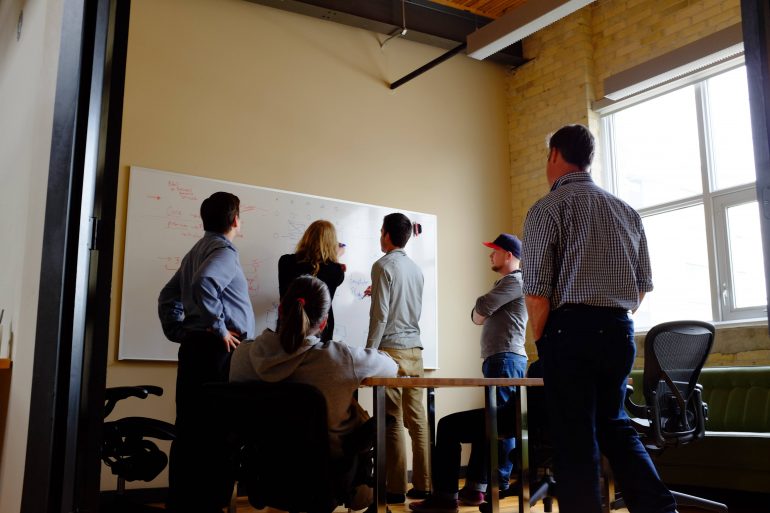On a call with Ben Morris, the Boltmade founder revealed to BetaKit that his startup grew from four to 12 people over the past year. The thing is, he neither actually wanted that, nor did he see it happening.
“We started out with four guys and our plan was just to have slow growth and basically make it through the year,” Morris told BetaKit. “The first year went a lot better than we were expecting.”
Boltmade makes custom mobile and web apps, starting with a great design and a plan to take it “from the whiteboard to reality.” The startup starts projects with intensive design studio meetings that draw on interdisciplinary experts from the team (and from the client’s). A minimum of two people must work on the project and jobs are always done using “co-innovation.”
“We’re not a regular software consultancy, where you come up with the 50 page document of exactly what you want, drop it on our desk and then we go away for six months, build it and throw the code over,” said Morris. “That’s really not what we want. We can’t differentiate ourselves that way and it’s not fun for us.”
Thus, Boltmade likes to work with projects that are a little bit earlier in the definition phase, because it ends up being where Morris feels the team can contribute much more value. “So we like projects where there might be a team on the other side that already exists who can bring us in, sort of for acceleration. They have their idea but maybe they can’t hire fast enough, they just need to add a little bit of spike to get to a deadline.”
Their work has included such apps as the Meagan app, which Boltmade helped design for Tacit Innovations (the creation of the app was completed in-house by the client though). The Bauer Kitchen proclaimed that the app would “revolutionize dining out” using an end-to-end dining system. Restaurant-goers can browse menus, manage their orders and pay for their meals from their smartphones. They can even pay for their bills via Bitcoin.
Other apps they’ve completed include Auvik, Exinda and Clearfit.
For Morris, few other options existed in January 2013 when Boltmade launched. He said there’s several great shops with one to five people who can make “small-scale” projects, but not much more. “Waterloo is known as an engineering powerhouse. The U of Waterloo is here, Blackberry, Google, all of the major players are here and everybody hires out of Waterloo for engineering, but there wasn’t really a place where you could take your product to and really trust that they do an awesome job at a large scale.”
Morris simply wants people to look at Boltmade as “the place where you can trust your product to,” and compares the quality of the 12-man outfit to places like Thoughtbot and Pivotal Labs. He recalled the early days of Twitter, when the company’s popularity was outgrowing its ability to hire developers. So, the social media site contracted out Pivotal Labs to bring in about 30 developers.
“There’s really nothing like that in Waterloo, and we thought we can take advantage of all the really awesome local talent we have here,” he said. He’s also ready to bump his headcount up to 22 people by the end of 2014.
I made sure to ask him where he thinks Kitchener-Waterloo is headed in terms of startup community supremacy. Morris thinks it’s just the beginning. He said five to seven years ago all the best talent graduated and went to work for Blackberry. Now all that talent is scattered throughout the region at small startups.
“There’s starting to be more capital flowing into the area and some of the first and second-tier VCs from the states are actually looking to Waterloo region instead of staying in Toronto,” he said. “We’re really building up an interesting ecosystem here with Vidyard and Thalmic Labs as sort of the poster children. And then there’s the large scale companies like Square and Google, so its really growing pretty quickly.”




